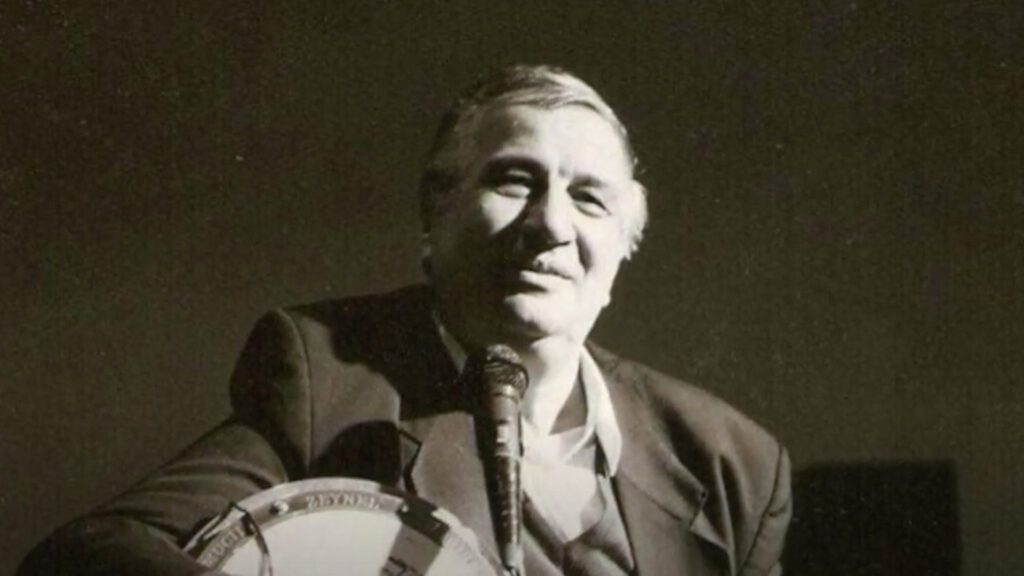Aram Tigran, Armenian singer (1934-2009)
Aram Tigran (1934-2009) was an Armenian musician who sang primarily in Kurdish, giving life to many beloved songs like “Bilbilo, Dîlberê.” By singing Kurdish songs, he earned an eternal place in the hearts of the Kurdish people. Fırat Anlı recalls: “Tigran is almost the first name that comes to mind when one speaks about Kurdish music. Everyone over a certain age in this region got to know music in their mother tongue because of Tigran, with his soft, emotional tunes, and the oud he was a master of.”
Aram Tigran was born in Qamishli in northeastern Syria. Both his parents were Armenian, and both were born in villages near the city of Diyarbakır. During the Armenian genocide of 1915, his parents had escaped—because a Kurdish family took his father in and protected him. So his father advised him, “Sing in Kurdish.” Aram Tigran remained faithful to his father’s will and throughout his life put great importance to the fraternity of the Kurdish and Armenian people.
At the age of six, his uncle gave him his first oud. His father taught him how to play it. He left school after ninth grade to learn music and play oud. He also learned to play the cümbüş, an oud-like instrument, in a Kurdish folkloric style. In 1953 he gave his first public concert at a Newroz celebration. By the age of twenty, he was singing in four languages: Kurdish, Arabic, Syriac, and Armenian.
In 1966 he moved to Yerevan, Armenia (then part of the Soviet Union), where for eighteen years he was employed by Radio Yerevan. In 1995 he left Armenia and settled in Athens.
He recorded 500 songs in Armenian, Kurdish, Syriac, Arabic, and Greek. His songs “Bilbilo, Dîlberê,” “Te Ez Kalkirim bi Ciwanî,” “Dîlber,” “Şev Çû,” “Dîyarbekir,” “Zimanê Kurdî,” “Ax Lê Eman” are cherished in the Kurdish repertoire.

Among his albums are:
- Ax dilberê (1992)
- Keçê dînê (1992)
- Rabin (1992)
- Xwezî dîsa zarbûma (1997)
- Evîna feqiyê Teyran (2002)
- Kurdistan (2004)
- Zîlan (2004)
- Serxwebûn xweş e, (2004)
- Çîyayê gebarê (2004)
- Gelê kurd dest bidin destê hev (2009)
- Keçê dînê (2016)
- Ax dîlberê (2016)
- Em hatin (2021)
- Hevalê serok (2022)
and many others
He said “If I was reborn and I had enough power, I would melt all the weapons, tanks and missiles in this world. And from the mass I would form tambours, cumbus and zurnas and distribute them to the people. Why should humans ever kill each other? Why!? Instead, they shall live with art, and be mirthful.”
Lorem ipsum dolor sit amet, consectetur adipiscing elit. Ut elit tellus, luctus nec ullamcorper mattis, pulvinar dapibus leo.
In late life
During Newroz 2008 celebrations in Batman, he sang in Kurdish, Turkish, Armenian and Arabic. He also sang “Sarı Gelin” in memory of assassinated journalist and human rights activist Hrant Dink.
In 2009 he was able to visit the villages where his parents grew up under the Ottoman Empire. He was welcomed in Diyarbakır and gave a concert at the Newroz celebrations in Batman. “It was our greatest dream for him to come to Diyarbakır and play at a concert,” said Firat Anlı. “It took us years to achieve it. Previously, the situation in Turkey made it impossible; he himself hesitated. But his first arrival was a historical event, like a dream. Thousands of people had tears in their eyes when they listened to him.”
During his stay in Diyarbakır, Tigran said he loved the city very much. “It was the dream of the century to come to Diyarbakır. I always used to say, ‘God, will I ever see the place where my parents lived before I die?’ Two years ago, after becoming a Greek citizen, I first came to Diyarbakır. I was very touched and wrote a song. One verse of it goes like this (in Kurdish):
Di xewnên şevan de min bawer nedikir
Bi çavan bibînim bajarê Diyarbekir
Rojbaş Diyarbekir me pir bêriya te kir
Te derî li me vekir
Te me şa kir.
If I had dreamed it, I would not have believed it
Being able to see Diyarbakır
Good morning Diyarbakır, I have missed you very much
You opened your gates to me
You made us very happy.
In 2009 he visited the Diyarbakir villages where his parents grew up during the Ottoman period. He gave a concert at the Newroz celebrations in Batman.
He died in Athens on August 8, 2009. He had said he wanted to be buried in Diyarbakır, but the Turkish Ministry of the Interior refused on grounds that he was not a Turkish citizen. Instead he was buried in a Brussels cemetery, and some soil from Diyarbakır was poured into his grave.
Tigran’s widow Sirvat Melikiyan said Kurdish identity, music and culture meant everything to him. “He deemed the freedom of the Kurdish people his own freedom. Until his death he stood with the Kurds. He always desired to contribute to the Kurdish culture. Therefore the Kurdish people have love for him.” And: “With his music Aram wanted to show that peoples are no enemies of each other. He used to say: ‘Through my music I will prove that Kurds and Armenians are brother peoples. I will rebut the enmity between people through my music.’”















